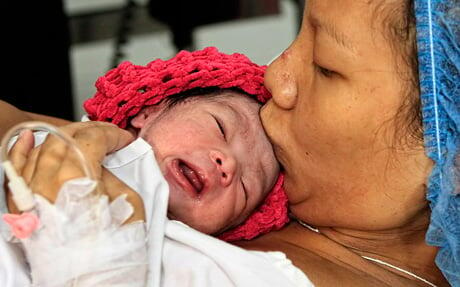BANGKOK – Several Asian babies born just after midnight have been selected in their countries to symbolize all who have just come into a world of 7 billion people.
By United Nations estimates, world population today passed the 7 billion mark. UNFPA, the United Nations Population Fund, is using the occasion to highlight the achievements, challenges and opportunities the population milestone represents.
Danica May Camacho, born in Manila, and Oishee Hussain, in Dhaka, were among those welcomed by government officials and UNFPA representatives in various capitals around the region.
Human numbers cannot be determined precisely, so these births are symbols of population trends: Asia and the world have twice as many people as they had four decades ago, even though the average family has only half as many children. Growth, while slowing, continues – mostly due to the momentum generated by past high fertility, as record numbers of young people enter their reproductive years.
The population of the Asia and the Pacific region, now about 4 billion, is projected to rise to 5 billion before levelling off around 2050. With people living longer, the proportion of those above age 60 will increase steadily.
Trends vary greatly among and within countries. India is projected to overtake China as the world’s most populous country by 2020 and continue to grow for 30 years after China’s population has peaked.
Indonesia and Bangladesh have already reached low fertility but growth will continue for 30-40 years. Pakistan and the Philippines will peak later; women in both countries still have more than three children on average.
Afghanistan and Timor-Leste have some of the highest fertility rates in the world, above six children per woman. Their populations are not expected to level off until the end of the century.
The median age in Asia is 30. Experts believe many countries with large numbers of young workers have unprecedented opportunities for economic growth, if they in invest in education, health and job creation.
Ensuring women’s rights and addressing inequality are also critical. Half of the 200 million women worldwide with an unmet need for contraception are Asians. Access to reproductive health care, including family planning and safe motherhood services, is often limited in poor communities, and each year tens of thousands of women die as a consequence.
UNFPA and its partners in countries throughout the region have organized numerous activities to highlight these issues, including photo contests and exhibitions, concerts, TV and radio talk shows and billboard campaigns. Countries honouring babies born today as symbols of a world of 7 billion include Bangladesh, Cambodia, Laos, the Maldives, Papua New Guinea and the Philippines.
For more information, please contact:
William A. Ryan, mobile +66 89 897 6984, ryanw@unfpa.org





